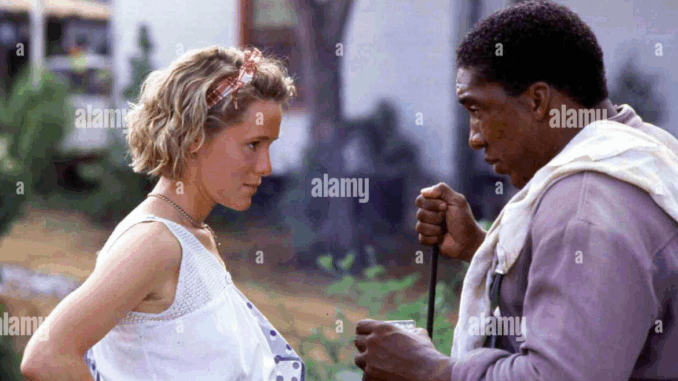
When Fried Green Tomatoes first hit theaters in 1991, it arrived like a gentle breeze through the dusty landscape of Hollywood dramas. Adapted from Fannie Flagg’s novel Fried Green Tomatoes at the Whistle Stop Cafe, the film seemed modest at first glance—a story of friendship, love, and resilience in a small Alabama town. Yet more than three decades later, it remains a cultural touchstone, cherished for its tender storytelling, unforgettable characters, and quiet but powerful social commentary.
A Story Woven Across Generations
The film unfolds through a dual timeline. In the present day, Evelyn Couch, a timid housewife played with quiet vulnerability by Kathy Bates, visits a nursing home and meets the spirited Ninny Threadgoode (Jessica Tandy in an Oscar-nominated performance). As Ninny recounts the history of Whistle Stop, Alabama, a second narrative emerges—one set in the 1920s and 1930s, centered on the deep bond between Idgie Threadgoode (Mary Stuart Masterson) and Ruth Jamison (Mary-Louise Parker).
The two women defy convention by running a café together during a time of economic hardship and racial segregation. Their relationship—often read by audiences as a tender love story—becomes the emotional heart of the film, illustrating themes of loyalty, courage, and chosen family.
Performances That Linger in Memory

The cast of Fried Green Tomatoes delivers performances as rich as the Southern cooking featured in the film. Jessica Tandy imbues Ninny with a mischievous wisdom that captivates both Evelyn and viewers alike. Kathy Bates brings a relatable depth to Evelyn, whose personal transformation—gaining confidence and reclaiming her voice—remains one of the movie’s most inspiring arcs.
Mary Stuart Masterson’s portrayal of Idgie is bold and charismatic, while Mary-Louise Parker’s Ruth balances grace and quiet strength. Together, their chemistry carries the story, making their friendship (and possible romance) timeless.
A Quiet Yet Bold Commentary
Beneath its warm, nostalgic surface, Fried Green Tomatoes grapples with weighty issues: racism, domestic abuse, and the limitations placed on women in the early 20th century. The Whistle Stop Café becomes a safe haven where kindness defies social barriers. The film never shouts its messages; instead, it lets acts of compassion—like feeding the hungry Black community during the Depression—speak volumes.
Lasting Cultural Impact
More than 30 years after its release, Fried Green Tomatoes continues to inspire new audiences. Fans revisit it for its comforting small-town charm, but also for its progressive undertones and subtle celebration of same-sex love at a time when Hollywood rarely told such stories openly. The film’s food imagery—especially its namesake dish—has also cemented its place in Southern culinary lore, sparking recipes, restaurant names, and fan pilgrimages to filming locations in Georgia.
A Legacy of Love and Resilience
Fried Green Tomatoes endures because it captures something universal: the need for connection and the courage to live authentically. Whether it is Evelyn learning to stand up for herself, Idgie refusing to be constrained by societal norms, or the townspeople of Whistle Stop finding community in their café, the film celebrates the strength that comes from friendship and love.
In an era of fast-moving entertainment and fleeting trends, Fried Green Tomatoes remains a reminder that the sweetest stories often simmer slowly—like a pot of coffee on a quiet Southern morning, or a plate of fried green tomatoes shared among friends.
